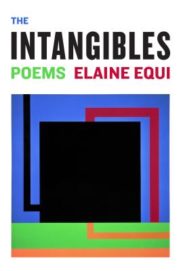 Elaine Equi
Elaine Equi
Coffee House Press ($16.95)
by Fran Webber
Written in her usual accessible style, Elaine Equi’s newest collection, The Intangibles, manages to be short and sweet as well as lingering, offering up pithy observations—whether of herself or strangers, t-shirts or wormholes—that can still prompt deeper contemplation.
Equi’s poems are chewy, each bite releasing new bursts of flavor. One is wit. In “Lazy Bones,” Equi writes of her desire to tell an attending radiology technician: “My bones are shy. // I don’t exercise. / I love coffee. // They know they’re weak / and don’t like being photographed.” Another flavor served up by Equi is exuberant irreverence, as in “Moon and Taxi”: “Look, it’s not so far tonight. // He can drive us all the way there. / I bet he even knows a shortcut.”
But a vein of gentle discontent with modern life runs through the work, too. Equi writes “I think I saw Robert Frank / having dinner in a restaurant, // . . . // I thought of asking how / Americans look to him today.” Certainly, Equi sees Americans today as isolated, alienated, technologically-fixated: “Flitting from screen to screen, /we polli-nated the mostly mediocre content/with an innocuous brand of wit.” Or:
I remember when people
used their hands to gestureand would meet each other’s eyes
with curiosity or annoyance,
but now everyone looks down,
studying their palms intently.
Our present predicament is folded into reflections on time, our past and future, and what we make of it. Equi knows, too, we can easily make a romance of history: “An unadorned war / may not be enough. / Without a hero, // a colorful coup / does not a blockbuster / movie make.” Difficult though modern life may be, the supposed idylls of our past are flimsy constructs within which we cannot shelter.
It sounds bleak but it doesn’t feel it—if only, perhaps, because it’s now so normalized a view of ourselves. Or perhaps because Equi takes care to balance this vision of contem-porary life’s erosion of human character with humor and solace:
Our view is one of constant deferral.
Obstruction is built upon
obstruction with a flair—garlands and gargoyles,
roadblocks and renovations.But all anyone ever needs
to take is the next step.The sky is torn in half.
Feet see below
to another world.
But if our past is a confection, and our present a mess, is redemption in our future? For Equi the secret of time seems to be that it’s a loop:
In Newton’s day, time was seen as an arrow.
The arrow turned into a river.
The river stopped at a diner.
I’m there now, drinking a cup of coffee, writing a poem
called “The Secret of Time Meets a Stranger.”Somehow, I always knew you would come.
Equi writes to “embellish facts”—in other words, to make meaning. But the intangibles of meaning are found “past the dazzling confounds” at “the high percolations /at the edge of”— the end of the poem. A poem’s power, its ability to speak to those intangi-bles of meaning, is just beyond the cliff of what’s said.
